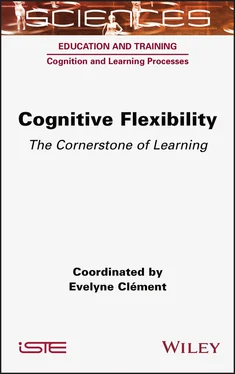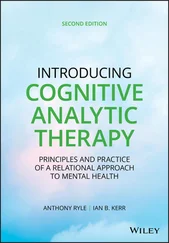Evelyne Clement - Cognitive Flexibility
Здесь есть возможность читать онлайн «Evelyne Clement - Cognitive Flexibility» — ознакомительный отрывок электронной книги совершенно бесплатно, а после прочтения отрывка купить полную версию. В некоторых случаях можно слушать аудио, скачать через торрент в формате fb2 и присутствует краткое содержание. Жанр: unrecognised, на английском языке. Описание произведения, (предисловие) а так же отзывы посетителей доступны на портале библиотеки ЛибКат.
- Название:Cognitive Flexibility
- Автор:
- Жанр:
- Год:неизвестен
- ISBN:нет данных
- Рейтинг книги:4 / 5. Голосов: 1
-
Избранное:Добавить в избранное
- Отзывы:
-
Ваша оценка:
- 80
- 1
- 2
- 3
- 4
- 5
Cognitive Flexibility: краткое содержание, описание и аннотация
Предлагаем к чтению аннотацию, описание, краткое содержание или предисловие (зависит от того, что написал сам автор книги «Cognitive Flexibility»). Если вы не нашли необходимую информацию о книге — напишите в комментариях, мы постараемся отыскать её.
Cognitive Flexibility — читать онлайн ознакомительный отрывок
Ниже представлен текст книги, разбитый по страницам. Система сохранения места последней прочитанной страницы, позволяет с удобством читать онлайн бесплатно книгу «Cognitive Flexibility», без необходимости каждый раз заново искать на чём Вы остановились. Поставьте закладку, и сможете в любой момент перейти на страницу, на которой закончили чтение.
Интервал:
Закладка:
100 93
101 94
102 95
103 96
104 97
105 98
106 99
107 100
108 101
109 102
110 103
111 104
112 105
113 106
114 107
115 108
116 109
117 110
118 111
119 112
120 113
121 114
122 115
123 116
124 117
125 118
126 119
127 120
128 121
129 122
130 123
131 124
132 125
133 126
134 127
135 128
136 129
137 130
138 131
139 132
140 133
141 134
142 135
143 136
144 137
145 138
146 139
147 140
148 141
149 142
150 143
151 144
152 145
153 146
154 147
155 148
156 149
157 150
158 151
159 152
160 153
161 154
162 155
163 156
164 157
165 158
166 159
167 160
168 161
169 162
170 163
171 164
172 165
173 166
174 167
175 168
176 169
177 170
178 171
179 172
180 173
181 174
182 175
183 176
184 177
185 178
186 179
187 180
188 181
189 182
190 183
191 184
192 185
193 186
194 187
195 188
196 189
197 190
198 191
199 192
200 193
201 194
202 195
203 196
204 197
205 198
206 199
207 200
208 201
209 202
210 203
211 204
212 205
213 206
214 207
215 208
216 209
217 210
218 211
219 212
220 213
221 214
222 215
223 216
224 217
225 218
226 219
227 220
228 221
229 222
230 223
231 224
232 225
233 226
234 227
235 228
236 229
237 230
238 231
239 232
240 233
241 234
242 235
243 236
244 237
245 238
SCIENCES
Education and Training , Field Director – Jean-Marc Labat
Cognition and Learning Processes , Subject Head – Emmanuel Sander
Cognitive Flexibility
The Cornerstone of Learning
Coordinated by
Evelyne Clément

First published 2022 in Great Britain and the United States by ISTE Ltd and John Wiley & Sons, Inc.
Apart from any fair dealing for the purposes of research or private study, or criticism or review, as permitted under the Copyright, Designs and Patents Act 1988, this publication may only be reproduced, stored or transmitted, in any form or by any means, with the prior permission in writing of the publishers, or in the case of reprographic reproduction in accordance with the terms and licenses issued by the CLA. Enquiries concerning reproduction outside these terms should be sent to the publishers at the undermentioned address:
ISTE Ltd
27-37 St George’s Road
London SW19 4EU
UK
www.iste.co.uk
John Wiley & Sons, Inc.
111 River Street
Hoboken, NJ 07030
USA
www.wiley.com
© ISTE Ltd 2022
The rights of Evelyne Clément to be identified as the author of this work have been asserted by her in accordance with the Copyright, Designs and Patents Act 1988.
Library of Congress Control Number: 2021946241
British Library Cataloguing-in-Publication Data
A CIP record for this book is available from the British Library
ISBN 978-1-78945-035-4
ERC code:
SH4 The Human Mind and Its Complexity
SH4_1 Cognitive basis of human development and education, developmental disorders; comparative cognition
SH4_6 Learning, memory; cognition in ageing
Introduction
Evelyne CLÉMENT
Paragraphe, CY Cergy Paris University, Gennevilliers, France
Over the past three decades, the study of the flexible nature of human cognition has been of growing interest to scientists and practitioners specializing in early childhood, neuropsychology and education. In many manifestations of human activity, an important issue is to understand the nature and development of cognitive flexibility and the processes and contexts that promote or inhibit its expression. This issue is crucial in the field of lifelong learning, and more particularly in the field of school learning.
As evidenced by the scientific literature in this field of research, and although different understandings of flexibility have been proposed – with some defining it as a general and universal process independent of the contexts in which it is expressed, others, on the contrary, as a skill that develops at the same time as other abilities, such as conceptual and language development – a broad consensus is emerging on the flexible nature of human cognition to adapt to novelty and unexpected events. In this sense, as a cornerstone of learning, cognitive flexibility allows us to adapt to a constantly changing environment, to discover solutions in new and/or unexpected situations, to transfer knowledge learned in one context to a new context, to select the relevant stimuli in the environment to achieve a goal, to switch our attention from one stimulus to another according to the constraints of the situation, to alternate between two possible forms of processing stimuli, and to change our representation of the goal we are pursuing.
In this way, the flexible character of human cognition enables conceptual development through a creative combination of concepts as well as new learning by modifying our knowledge and habits in order to adapt to the situations in which we evolve and which we have to face. Moreover, this specificity of human cognition allows for the activation and flexible communication of representations in a wide range of activities, whether it is, for example, understanding a metaphor, being moved when reading a poem, using an object in a non-usual function, solving a problem, inferring and understanding the meaning of a new word, or adapting to a new work environment.
Cognitive flexibility plays a key role in the development of thought, reasoning and the acquisition of new knowledge, but also in the mediation of social interactions, the sharing of points of view and the elaboration of socially coordinated action plans. In short, its involvement is fundamental in accommodating the environment in which we evolve and in adapting to the predictable – or unpredictable – circumstances we encounter.
This collective work, written by French specialists in the field, presents the state of the art of current research in cognitive, educational and developmental psychology on cognitive flexibility. The book addresses current and topical questions concerning the measures of cognitive flexibility, the development of this skill in young children, its links with the development of metacognition and critical thinking, its implication in solution discovery, transfer of learning, evocation and matching between analogous situations, as well as the context and content effects that can impact our reasoning and their flexible expression in school learning situations.
Chapter 1(Célia Maintenant and Gaëlle Bodi) reviews the different tools available to the clinician psychologist and/or researcher to evaluate this process. The authors present the so-called “direct” methods, which involve an evaluation of flexibility capacities by means of a concrete situation (a task constructed in the laboratory or a more ecological situation), and the so-called “indirect” methods, which use questionnaires and are the most commonly used in neuropsychological assessments of patients with executive dysfunction or of very young children.
Читать дальшеИнтервал:
Закладка:
Похожие книги на «Cognitive Flexibility»
Представляем Вашему вниманию похожие книги на «Cognitive Flexibility» списком для выбора. Мы отобрали схожую по названию и смыслу литературу в надежде предоставить читателям больше вариантов отыскать новые, интересные, ещё непрочитанные произведения.
Обсуждение, отзывы о книге «Cognitive Flexibility» и просто собственные мнения читателей. Оставьте ваши комментарии, напишите, что Вы думаете о произведении, его смысле или главных героях. Укажите что конкретно понравилось, а что нет, и почему Вы так считаете.












